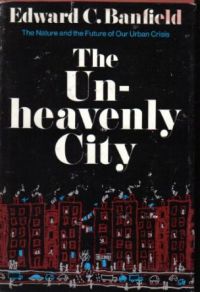–С—Г–Ї–†–Є–≤–µ—А —Б–Њ–Ј–і–∞–љ –і–ї—П —В–Њ–≥–Њ, —З—В–Њ–±—Л –≤—Л –Љ–Њ–≥–ї–Є –њ–Њ–Љ–µ–љ—П—В—М –њ—А–Њ—З–Є—В–∞–љ–љ—Г—О –Ї–љ–Є–≥—Г –љ–∞ –ї—О–±—Г—О –і—А—Г–≥—Г—О –Є–ї–Є –њ—А–Њ—Б—В–Њ –њ–Њ–і–∞—А–Є—В—М —Е–Њ—А–Њ—И–µ–Љ—Г —З–µ–ї–Њ–≤–µ–Ї—Г, –њ–Њ–Ї–∞ –Њ–љ–∞ –љ–µ –њ–Њ–≥–Є–±–ї–∞ –њ–Њ–і —Б–ї–Њ–µ–Љ –њ—Л–ї–Є –љ–∞ –≤–∞—И–µ–є –њ–Њ–ї–Ї–µ.
–Ъ–∞–Ї —Н—В–Њ —А–∞–±–Њ—В–∞–µ—В –І—В–Њ –≤—Л —Е–Њ—В–Є—В–µ –њ—А–Њ—З–Є—В–∞—В—М? –Я—А–Є—Б–Њ–µ–і–Є–љ–Є—В—М—Б—П –Ї –С—Г–Ї–†–Є–≤–µ—А—Г
–Ъ–∞–Ї —Н—В–Њ —А–∞–±–Њ—В–∞–µ—В –І—В–Њ –≤—Л —Е–Њ—В–Є—В–µ –њ—А–Њ—З–Є—В–∞—В—М? –Я—А–Є—Б–Њ–µ–і–Є–љ–Є—В—М—Б—П –Ї –С—Г–Ї–†–Є–≤–µ—А—Г
–Я–Њ–Є—Б–Ї → The Unheavenly City
–°–Њ–≤—А–µ–Љ–µ–љ–љ–∞—П –ї–Є—В–µ—А–∞—В—Г—А–∞
English
–•—Г–і–Њ–ґ–µ—Б—В–≤–µ–љ–љ–∞—П –ї–Є—В–µ—А–∞—В—Г—А–∞
–Ш–Ј—Г—З–µ–љ–Є–µ —П–Ј—Л–Ї–Њ–≤

«The Unheavenly City», Edward C.Banfield
150—А
It is almost four decades since Edward Banfield's highly controversial The Unheavenly City was published but it is still making waves.
While Banfield had many brilliant observations on race, crime, and other hot topics in his book, it was his innovative redefinition of the concept of social class that is most memorable and which has drawn the most controversy.
Banfield carefully defined class membership, not in terms of income status, such as government statistical poverty levels, but in terms of orientation toward the future, or time preference.
The more pronounced one's "future orientation" was, the higher one's social class.
Multicultural critics of this idea now claim it is "cultural racism" to value or promote "future time orientation."
Known to economists and other social scientists as "low time-preference," this is what is called setting goals or encouraging purposeful "middle class values" such as punctuality, thrift, foresight, deferred self-gratification of needs or wants, and self-discipline as opposed to "underclass values" or "high time-preference" behaviors such as improvidence, hedonism, purposelessness, immediate self-gratification of needs or wants, and capricious spontaneity or irresponsibility.
The Unheavenly City continues to define the real class struggle in America.
It is almost four decades since Edward Banfield's highly controversial The Unheavenly City was published but it is still making waves.
While Banfield had many brilliant observations on race, crime, and other hot topics in his book, it was his innovative redefinition of the concept of social class that is most memorable and which has drawn the most controversy.
Banfield carefully defined class membership, not in terms of income status, such as government statistical poverty levels, but in terms of orientation toward the future, or time preference.
The more pronounced one's "future orientation" was, the higher one's social class.
Multicultural critics of this idea now claim it is "cultural racism" to value or promote "future time orientation."
Known to economists and other social scientists as "low time-preference," this is what is called setting goals or encouraging purposeful "middle class values" such as punctuality, thrift, foresight, deferred self-gratification of needs or wants, and self-discipline as opposed to "underclass values" or "high time-preference" behaviors such as improvidence, hedonism, purposelessness, immediate self-gratification of needs or wants, and capricious spontaneity or irresponsibility.
The Unheavenly City continues to define the real class struggle in America.
 –†–∞—Б—Б–Ї–∞–ґ–Є—В–µ –і—А—Г–Ј—М—П–Љ –Њ–± —Н—В–Њ–є –Ї–љ–Є–≥–µ. –Ю—В–њ—А–∞–≤—М—В–µ –Є–Љ —Н—В—Г —Б—Б—Л–ї–Ї—Г
–†–∞—Б—Б–Ї–∞–ґ–Є—В–µ –і—А—Г–Ј—М—П–Љ –Њ–± —Н—В–Њ–є –Ї–љ–Є–≥–µ. –Ю—В–њ—А–∞–≤—М—В–µ –Є–Љ —Н—В—Г —Б—Б—Л–ї–Ї—Г

–Ь–љ–µ–љ–Є—П –Њ –Ї–љ–Є–≥–µ
–Ь–љ–µ–љ–Є–є –њ–Њ–Ї–∞ –љ–µ—В. –Ь–Њ–ґ–µ—В –±—Л—В—М –Т—Л –њ–Њ–њ—А–Њ–±—Г–µ—В–µ? ;)